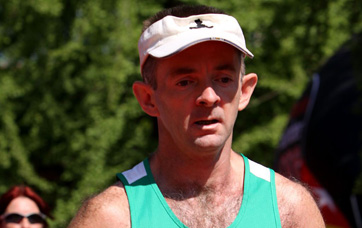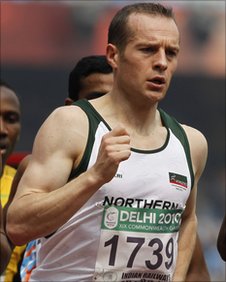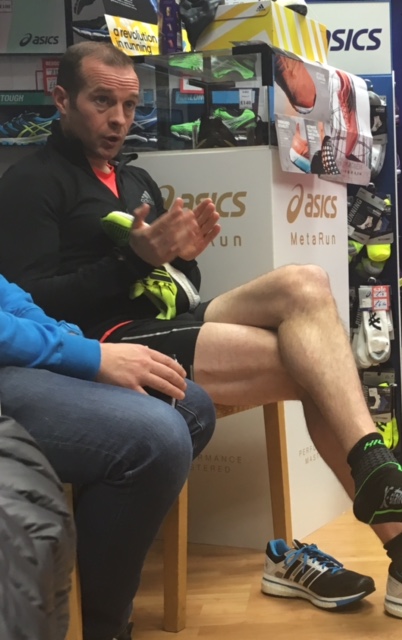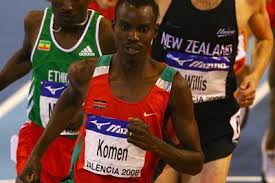'Belfast Marathon could be so much better' is about the kindest remark local runners have to say about it. Visitors maybe slightly more sanguine but generally think the route and organisation, especially at the finish could be vastly improved. Before we go any further we have to explain what the Belfast Marathon is, which says a lot in itself.
What is the Belfast Marathon?
The Belfast Marathon is actually a collection of different races. In 2015, the Belfast Marathon consisted of:
- 3,001 marathon runners (9:00am start)
- 1,200 marathon walkers (9:00am start)
- 1,500 fun-runners (9:20am start)
- 9,750 relay runners (9:00am start)
The fun run is a 5km race that starts just after the marathon at the same starting point. This is open to anyone, but is generally for kids. Marathon walk, is actually only 8 miles and is non-competitive for general walkers. The main marathon race is 26.2 miles, with wheelchair racers starting a few minutes before everyone else.
The relay appears to be a uniquely Belfast invention, with almost 2,000 teams in 2015. Teams comprise 5 people, with each runner running a 3.5-8 mile leg of the marathon. This allows people of all abilities to take part in the 'Belfast Marathon' and greatly opens up the event. However they run at the same time as the main runners, and it can be chaotic at the change over points, water stations and finish with so many relay runners. It can also annoy you when, relay runners dart past you especially in the later half of the race. However without them their would be an awful lot less people on and supporting the route. Overall though I welcome the idea of relay runners, especially with current numbers.
NB Less than 1 in 5 (19.4%) people taking part in the Belfast Marathon 'events' are actually running the full Belfast Marathon
How Does it Compare to Other Marathons?
Compared to major large city marathons, it's disappointing. It'll never - nor should it - compete with London (usually the week before) and other "World Marathons", but it could and should aim for matching Dublin, and other large UK cities. Crowds, support, atmosphere, route and event organisation are what separate Belfast from other cities. As a comparator the recent Dublin Marathon (Monday, 26 Oct 2015) had 15,000 marathon runners and is now moving to Sunday mornings to accommodate more. Participants comment on the atmosphere, the city really treats it as a major event, with large crowds out supporting runners at all times along the route. It's well organised at the finish and the roads are mostly completely closed to give you plenty of space, plus they bring you past the major landmarks and through Phoenix Park so it's an enjoyable route.
Dublin started in 1980, with Belfast in 1982. So both have been around for a long time. Derry (Walled City Marathon started in 2013, attracts over 2,000 runners and is on 4-5 weeks after the Belfast Marathon) has only just started, with most major towns/cities in Ireland having at least an annual half or full marathon. Dublin has a dedicated race series - a 10k, 10 mile, half marathon in the three months before the race that attracts thousands of people to Phoenix Park and are well organised and provide a great training build up for the race. Belfast first put on a half-marathon three years ago but this is on in September... almost 8 months before the marathon. It was also on the Sunday, the day after the Dublin Half-Marathon, which suggests poor co-ordination (it had been on the same day as the Walled City Half-Marathon in previous years). Although improving and still in it's relative infancy with the route changing each year it has managed to attract large crowds of 3,000 runners. However, if it wasn't against the Dublin half-marathon (the most popular half-marathon in Ireland) it could do so much better.
How Bad is the Belfast Marathon?
The major issue is the route. Belfast is 44.4 square miles, within which there are some amazing landmarks, historic and infamous locations, lively arterial routes, fantastic parks and off-road trails yet the route takes you outside of Belfast (to neighbouring Newtownabbey), alongside a motorway and by-pass, and through a working industrial estate that is open, barren with aromas. At least 6-7 mile is like this, crucially the 16-20 mile bit when people begin to tire and approach the wall. To be fair the race starts outside the City Hall and finishes through the city, along the river and in picturesque Ormeau Park.
Outside of the city centre, Belfast is not a flat city, but the course is generally flat with a few hills generating the majority of the 700ft of elevation (it's not a PB course). Not massive, but after a long hill bringing you from 10-13 mile, you have steep 0.5-1 mile at about 14-15 mile that just batters the joints and loses all height gained. The Loughshore (about 16-18 miles) is a narrow 2m wide path with Belfast Lough on one side and the motorway on the other. You are open to the elements and it can be difficult to pass two runners running side by side. Duncrue Industrial estate is open, so the traffic has to be managed which means runners have to be occasionally stopped to let traffic through. Some of the roads have only one lane, which can mean over-taking is hard... can be annoying when several relay runners there. [Belfast Marathon organisers state that there is no legislation to allow them to open roads. However any resident of Belfast will tell you that where there is a will there is a way, and the authorities - and others - have been able to open and close roads when they need to]
If the route didn't have to go to Newtownabbey, there would be significant scope to vastly improve it. Politicians will want the route to be in all their areas or at least in North, South, East & West Belfast. The Belfast Half-Marathon (run by the same organisers as Belfast Marathon) has shown that organisers are able to change the route and to run it on a Sunday morning in Belfast. When Belfast hosted the Giro in 2015, it was able to close large sections of roads on Fri, Sat and Sun (with plenty of funding to tidy the route and put up pink cycles). Plus NI has and will be holding major international golf competitions with the final day on a Sunday, and this has not caused problems. So the major parties (e.g. Tourism NI, Belfast City Council, Roads NI, NI Executive/Departments) and politicians have shown a precedent for facilitating major sporting events. Furthermore their support, along with wider Belfast general public, for park runs and JogBelfast indicate there is a real commitment to getting Belfast active and desire to support running at the ground level.
Aside from the route and relay runners, the biggest complaint is the organisation. Especially as you cross the finish line, it is chaotic. Everyone is together, it is not clear where to get your drop bag (not to mention how secure it is, though to be fair generally few issues), where to get showers/changed, where are the buses, where to go next, and where to get refreshments etc. It is far too crowded, especially with relay runners in the mix too. On a good day, for a local this can be overlooked but in bad weather... and if you're not familiar with Ormeau Park it could appear very chaotic and confusing. Relay runners have also issues getting to and from relay stops, although there are buses. However the worst part of the relays is probably waiting for other runners (a long time waiting about) and finding them at the changeover.
Water is given out in cups, which is hard to drink if running and generally gets thrown over you. Sports cap bottles are easier to drink from but then you also see them discarded in the half-mile after the drink station, most almost full. I don't know what the magic answer is, but i would tell runners to have people meet them at 2-3 strategic points with drinks... but again not always a viable option for visitors. For 2016, Belfast Marathon will have the following stations:
- 4 Energy Drinks
- 17 First Aid
- 17 Water Stations
- 9 Toilet Facilities
- 1 Nutrition Station
- 2 Gel Stops
No New York but to be fair not bad for the scale of the race. Supporters will also have ad hoc water stations, which contributes to the atmosphere. Again, you have to plan your nutrition and hydration for a marathon carefully, and there are a few points round the race where you could stop in the shop to buy a drink (i have done that before and was ever glad on a warm day a few years ago for a cold lucozade... but again that was inside knowledge of shop locations and having money with me for said emergency). In short it's not the worst issue.
At the start, as with most major races toilets are scarce and i wouldn't touch the lower walls of any alleys. Belfast is quiet over weekends and bank holiday mornings, but there are generally shops open and accessing the town is not a major problem, although some people have complained about the start. Belfast doesn't have the crowds that other marathons do, this is partly because of the size/ambition of the race and prohibitive route. Belfast people are willing to support events and many do come out and provide great support, which is enormously appreciated. There is music in places, but it's not the welcome nature visitor generally get in Belfast and is a far cry from Dublin and other major marathons where you don't go a few hundred metres without vocal, vibrant and enthusiastic support.
The final issue is that, like some other races, organisers really try and push you to do it for a charity. This is tainted by the fact, that allegedly some of these charities may be paying marathon organisers for this privilege.
NB Between April 10th & June 5th, there are the London, Edinburgh, Manchester, Liverpool, Walled City marathons to name but a few. In total there are over 25 marathons in the UK, 3 of which are on the same weekend, not counting others in Ireland and beyond during that 8 week period. Belfast has competition, but there should still be lots of scope to carve out a niche event.
Are There Any Good Points about Belfast Marathon?
Belfast is my home city, I love it and think it's a fantastic city to visit and run in. So if the Belfast Marathon encourages people to do that, brilliant. It's also amazing to have a marathon on your doorstep in terms of accommodation, eating, drinking, logistics, family and friends, knowledge of route, passing where you grew up, start at City Hall, finishing straight down Ravenhill Road, meeting people at Ormeau Park afterwards (in good weather) and celebrating win, lose or draw in Errigle afterwards. Allowing relay and other runners to be part of the occasion also adds greatly to the event. However, a lot of that is because I'm born and bred on the Ormeau Road and a, not relying on getting stuff at the finish. I almost respect it more for being a tough race, for all it's awkwardness... it's not the best marathon but it's ours.
Pacers are there, many who also pace Dublin and London, especially the 3hr mark. If looking a 3hr, i would recommend it as long as you are aware of the course. Belfast is easily accessible to - and via - most major UK cities and has a growing portfolio of hotels. Along with airbnb there should be plenty of options and opportunities for people of all budgets. At £35 cost (although slight increase in last 2 weeks before closing date), including good quality short sleeved t-shirt it is very reasonable for a marathon. You also have no problems registering, the website is informative and you're not in a raffle for a place. I love those people who do come out and support the runners, who make some noise, take pride in Belfast, it makes such a difference and to the volunteers who give out water... this is what sport is about, and these people deserve full respect. No matter what you think of the organisers, these people are stars.
In NI, there are plenty of half-marathons (e.g Larne and Omagh) in the run-up to Belfast Marathon that provide great training opportunities and can be built into your training schedule. Taking place on bank holiday Monday allows a lot of people to take part and is perfect calendar target for starting training in the new year (new years resolutions) and provides you with a great training base for Dublin, always a great annual running compliment in October.
Based on 2015 numbers, Belfast Marathon generated approximately £313,535 from entry fees (plus £19,127.50 from charging £2.50 commission on each online payment). There are also 13 sponsors, not counting charities, so there is a good revenue and resource base to build on. Plus it has a history of going on throughout the troubles, but perhaps it is showing it's age.
NB It should also be remembered that Belfast Marathon had dealt with bombscares and other issues; and that it hasn't had a major mistake (e.g. route too long/short, running out of water) such as some other marathons.
What Is The Solution?
I propose the following 5 steps to make it better:
1. Clear Goals
An aggressive challenging target of at least 10,000 full marathon runners within 5 years. This is not a marginal or incremental approach to change. It's having a tough target and getting all parties to agree a whole new approach and attitude towards getting it. There should be scope to change it or involve other races e.g. half marathon (if Marathon cannot generate enough runners on its own).
NB Between 2009 an 2014, global marathon runners grew by 13%, whilst the UK actually fell by 5%. Belfast & NI has seen a surge in races, running events (e.g. colour run) and participation but the fall in marathon running across the UK allied with increased marathon competition and people willing to travel for races means Belfast has to react and come up with a decent plan.
2. Move to Sunday & New Route
Keep the Belfast Marathon in Belfast boundary and show off the best of our city. Move to Sunday morning, which will make it easier to close off roads and allow more people to make a weekend of it. There needs to be the same flexibility with Marathon route as the half-marathon whilst people get the route right (incorporate more landmarks, nicer bits of Belfast) and that it is able to handle the growth. Runners shouldn't be stopped along the route, with the route a minimum of 5m wide the whole way.
3. Better Organisation, especially Ormeau Park
You cross the finish line at Dublin and then are into a closed off-area only for runners. This gives you time and space to collect your bag (minded by race staff/volunteers), get your marathon finishers bag and meet other runners. Belfast is a world away, we need to make this much better for visitors... and sort out how best to provide hydration, is there a better option than cups. We also need to make runners much more aware of all the other races and run routes in and around Belfast, tow-path, Belfast Hills, Belvoir etc, various parks. Every aspect should be improved including the expo and the whole build up and to making it a marathon weekend.
4. Better Marketing & Co-ordination
Belfast Marathon's collection of races should be reconsidered. In addition Belfast Marathon should have a better co-ordinated race series, even if this is linking with the existing Pure Running NI half-marathon championship series of races. Born 2 run, 26Extreme and Energia 24hr have shown how races can be packaged, managed and marketed effectively. They, and others, have also shown how much people are willing to pay for races (many £16 plus for 10k races), plus Dublin has tiered charging up to €90, so people will pay if the product is right. Belfast also needs to ditch the heavy push for charities and make clear it's link with charities, allow people to make up their own mind and be under no pressure to support any charity. Belfast should also seek a major sponsor and should consider niche angles for some of the race events (e.g. the success of rock n roll marathon etc show that when marketed right, you will get participants).
5. New Blood & New Attitude From Public Bodies
Nothing will happen without a change in attitude from public bodies, marathon organisers and general public. Public bodies need to treat the marathon as a major international sporting event and not a local race. In the USA, Runners World readers have an average income significantly higher than that of many business magazines and are the exact visitor profile of people Belfast should be targeting. Runners will stay overnight, go out and will pass on word of mouth. Older runners will bring families or go with their mates/club. And this is an annual race, so repeat and legacy opportunities if marketed well.
This does not require a marketing firm or massive budget, a huge amount could be learned by speaking to local runners, visiting (and ideally running) Dublin marathon, half-marathon and other races. Belfast Marathon is run by a company, with 5 of the 9 directors in position since 1982 when it was established. They should be thanked for starting the marathon (in the midst of the troubles) running it to date and keeping the price low. They could be offered first go and reforming the Belfast Marathon, but if no radical plan and obvious change within 12 months then the Belfast Marathon should be tendered or put out to groups willing to invest in it and come up with ambitious plan (we need our own Fred Lebow, watch "Run for Your Life"). There should be more accountability, why does one company currently have exclusive right to this event? Caveats and safeguards could be put in but there needs to scope to try new initiatives and approaches (some of which may fail, that is the risk). The Belfast public, as park runs, various races, events, volunteering and JogBelfast demonstrate are willing to get involved and support running and local sport events. The ones who help create atmosphere are brilliant, but let's give them a reason to get out and cheer, let's put Belfast Marathon on the international running map.
Thoughts welcome.












